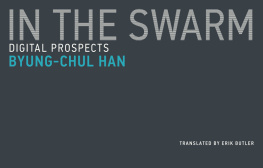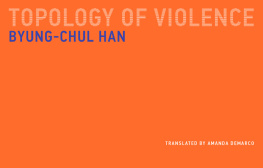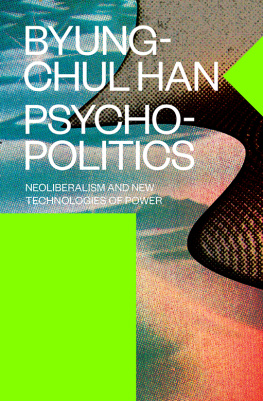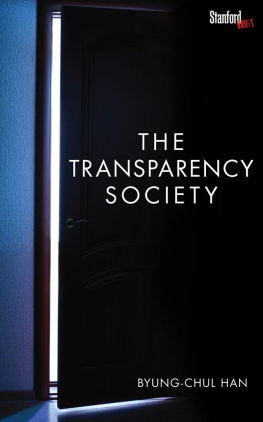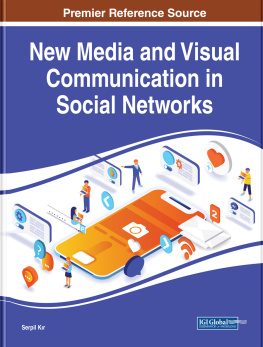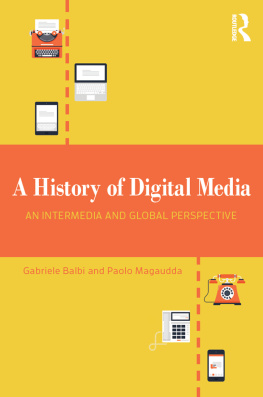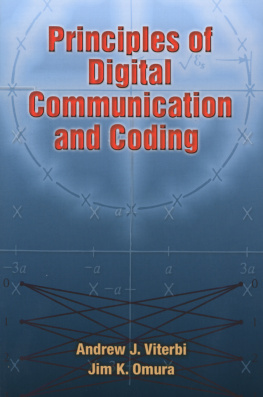
Untimely Meditations
1.The Agony of Eros
Byung-Chul Han
2.On Hitlers Mein Kampf: The Poetics of National Socialism
Albrecht Koschorke
3.In the Swarm: Digital Prospects
Byung-Chul Han
4.TheTerror of Evidence
Marcus Steinweg
In the Swarm
Digital Prospects
Byung-Chul Han
Translated by Erik Butler
The MIT Press
Cambridge, Massachusetts
London, England
2017 Massachusetts Institute of Technology
Originally published as Im Schwarm: Ansichten des Digitalen in the series Frhliche Wissenschaft by Matthes & Seitz Berlin: Matthes & Seitz Berlin Verlagsgesellschaft mbH, Berlin 2013. All rights reserved.

The translation of this work was supported by a grant from the Goethe-Institut, which is funded by the German Ministry of Foreign Affairs.
All rights reserved. No part of this book may be reproduced in any form by any electronic or mechanical means (including photocopying, recording, or information storage and retrieval) without permission in writing from the publisher.
This book was set in PF Din Text Pro by Toppan Best-set Premedia Limited. Printed and bound in the United States of America.
Library of Congress Cataloging-in-Publication Data
Names: Han, Byung-Chul, author.
Title: In the swarm : digital prospects / Byung-Chul Han ; translated by Erik Butler.
Other titles: Im Schwarm. English
Description: Cambridge, MA : MIT Press, 2017. | Series: Untimely meditations | Includes bibliographical references and index.
Identifiers: LCCN 2016031907 | ISBN 9780262533362 (pbk. : alk. paper)
eISBN 9780262339261
Subjects: LCSH: Internet--Social aspects. | Digital media--Social aspects. | Communication--Social aspects.
Classification: LCC HM851 .H344813 2017 | DDC 302.23/1--dc23 LC record available at https://lccn.loc.gov/2016031907
ePub Version 1.0
My tears are flowing; earth, take back your child!
Faust
Preface
In view of the meteoric rise of electrical media, Marshall McLuhan observed in 1964: The electric technology is within the gates, and we are numb, deaf, blind, and mute about its encounter with the Gutenberg technology. Matters stand much the same today with regard to digital media. This new medium is reprogramming us, yet we fail to grasp the radical paradigm shift that is underway. We are hobbling along after the very medium that, below our threshold of conscious decision, is definitively changing the ways that we act, perceive, feel, think, and live together. We are enraptured by the digital medium yet unable to gauge the consequences of our frenzy fully. The crisis we are now experiencing follows from our blindness and stupefaction.
Note
Marshall McLuhan,
Essential McLuhan, ed. Eric McLuhan and Frank Zingrone (New York: Basic Books, 1995), 158.
No Respect
Literally, respect means to look back. It stands for consideration and caution [Rcksicht]. Respectful interaction with others involves refraining from curious staring. Respect presupposes a distanced lookthe pathos of distance. Today, it is yielding to the obtrusive staring of spectacle. The Latin verb spectare, from which spectacle derives, is voyeuristic gazing that lacks deferential considerationthat is, respect (respectare). Distance is what makes respectare different from spectare. A society without respect, without the pathos of distance, paves the way for the society of scandal.
Respect forms the foundation for the public, or civil, sphere. When the former weakens, the latter collapses. The decline of civil society and a mounting lack of respect are mutually conditioning. Among other things, civil society requires respectfully looking away from what is private. Taking distance is what constitutes the public sphere. Today, however, a complete lack of distance and deference prevails: intimate matters are put on display, and the private is made public. Lets call it a matter of stance: Without distance, it is impossible to be in good standing. Understanding also requires a distanced perspective. Across the board, digital communication is abolishing distance and distances. The corollary of dwindling spatial distance is the erosion of mental distance. Digital mediality works to the detriment of respect. In contrast, isolating and setting apartas in the adyton of ancient Greek templesgenerates admiration and reverence.
When distance proves lacking, the public and the private become confused. Digital communication is fostering this pornographic display of intimacy and the private sphere. Social networks wind up being exhibition rooms for highly personal matters. As such, the digital medium privatizes communication by shifting the site where information is produced. Roland Barthes defined the private sphere as that zone of space, of time, where I am not an image, an object. But if this the case, we no longer have any private sphere at all: no zone exists where I am not an image, where no camera is in operation. Google Glass even transforms the human eye into a camera. The eye itself generates images. In consequence, the private sphere cannot hold. Compulsive icono-pornography is abolishing it entirely.
Respect is tied to names. Anonymity and respect rule each other out. The anonymous communication promoted by digital media is dismantling respect on a massive scale. It is also responsible for the expanding culture of indiscretion and disrespect. Social media shitstorms are anonymous, too. That is the source of their power. Names and respect are linked. A name provides the basis for recognition, which always occurs by name. Practices that involve responsibility, trustworthiness, and reliability are also tied to being named. Trust may be defined as faith in the name. Giving answers and promising are also acts of the name. The digital mediumwhich separates messages from messengers, news from its sourceis destroying names.
Shitstorms occur for many reasons. They arise in a culture where respect is lacking and indiscretion prevails. The shitstorm represents an authentic phenomenon of digital communication. As such, it differs fundamentally from yesteryears angry letters to the editor. Inasmuch as letters are tied to the analog medium of writing, they are named events. Anonymous letters are readily discarded. Moreover, letters possess a different temporality. As the writer laboriously composes a missive by hand or on a typewriter, immediate agitation and excitement pass. In contrast, digital communication enables affective discharge right away. On the basis of its temporality alone, it conveys impulsive reactions more than analog communication does. In this respect, the digital medium is a medium of affect.
Digital networking favors symmetrical communication. Today, participants in communication do not just consume information passively: they generate it actively. No univocal hierarchy separates the sender from the receiver. Everyone is sender and receiverconsumer and producerin one. However, such symmetry exists to the detriment of power. The communication of power passes in one directionfrom top to bottom. Now, communicative reflux is destroying the existing regimes of power. Shitstorms amount to kind of reflux, with all the destructive effects that this entails.
The shitstorm is emblematic of displacements within the economy of power governing political communication. It swells in spaces where power and authority have weakened. In particular, shitstorms flourish where hierarchies have flattened out. As a medium, power ensures that communication flows speedily in one direction. The choices effected by the intendant of power are followed
Next page
